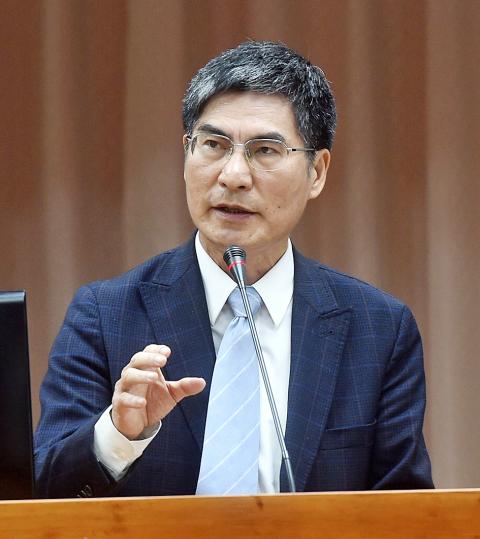Taiwan’s long-term technological competitiveness could be undermined by a decline in government funding for basic university research, Minister of Science and Technology (MOST) Chen Liang-gee (陳良基) warned yesterday.
Basic research lays the foundation for technological innovation and industrial transformation, Chen said at a meeting of the Legislative Yuan’s Education and Culture Committee, adding that he hopes lawmakers would unfreeze some of the ministry’s funds.
The amount in the national budget allocated to technology has grown from NT$94.2 billion (US$3.03 billion) in 2010 to NT$115 billion in this fiscal year, the highest in 10 years, Chen said.

Photo: Chien Jung-fong, Taipei Times
However, the percentage of funds allocated to basic research has fallen from 10.2 percent of the national budget in 2008 to 7.8 percent in 2017, the lowest over the period, he said.
Since March 2014, when the National Science Council was reorganized as the Ministry of Science and Technology, the government started to slip in its support of basic university research, while the number of research papers began to fall at about the same time, he said.
Taiwan used to publish more research papers than Switzerland, but since 2013, Switzerland has surpassed Taiwan, he said, citing data compiled by the ministry’s National Applied Research Laboratories.
The decline in basic research is a bad indicator for long-term technological development, as countries with advanced technology — Japan, South Korea, the Netherlands, the US and China — consider it the key to boosting national competitiveness, Chen said, adding that among the countries, Taiwan’s allocation for basic research is only lower than China’s.
However, China has plenty of public funding for universities, Chen said, adding that Tsinghua University in Beijing has an annual budget of more than 20 billion yuan (US$2.91 billion), almost double the allocation for basic research in Taiwan.
Many academics have complained about shrinking public funds and the unfair distribution of resources. In January, Chen vowed to increase the budget for basic research by 10 percent a year.

ECHOVIRUS 11: The rate of enterovirus infections in northern Taiwan increased last week, with a four-year-old girl developing acute flaccid paralysis, the CDC said Two imported cases of chikungunya fever were reported last week, raising the total this year to 13 cases — the most for the same period in 18 years, the Centers for Disease Control (CDC) said yesterday. The two cases were a Taiwanese and a foreign national who both arrived from Indonesia, CDC Epidemic Intelligence Center Deputy Director Lee Chia-lin (李佳琳) said. The 13 cases reported this year are the most for the same period since chikungunya was added to the list of notifiable communicable diseases in October 2007, she said, adding that all the cases this year were imported, including 11 from

Prosecutors in New Taipei City yesterday indicted 31 individuals affiliated with the Chinese Nationalist Party (KMT) for allegedly forging thousands of signatures in recall campaigns targeting three Democratic Progressive Party (DPP) lawmakers. The indictments stem from investigations launched earlier this year after DPP lawmakers Su Chiao-hui (蘇巧慧) and Lee Kuen-cheng (李坤城) filed criminal complaints accusing campaign organizers of submitting false signatures in recall petitions against them. According to the New Taipei District Prosecutors Office, a total of 2,566 forged recall proposal forms in the initial proposer petition were found during the probe. Among those

The Mainland Affairs Council (MAC) today condemned the Chinese Communist Party (CCP) after the Czech officials confirmed that Chinese agents had surveilled Vice President Hsiao Bi-khim (蕭美琴) during her visit to Prague in March last year. Czech Military Intelligence director Petr Bartovsky yesterday said that Chinese operatives had attempted to create the conditions to carry out a demonstrative incident involving Hsiao, going as far as to plan a collision with her car. Hsiao was vice president-elect at the time. The MAC said that it has requested an explanation and demanded a public apology from Beijing. The CCP has repeatedly ignored the desires

The Ma-anshan Nuclear Power Plant’s license has expired and it cannot simply be restarted, the Executive Yuan said today, ahead of national debates on the nuclear power referendum. The No. 2 reactor at the Ma-anshan Nuclear Power Plant in Pingtung County was disconnected from the nation’s power grid and completely shut down on May 17, the day its license expired. The government would prioritize people’s safety and conduct necessary evaluations and checks if there is a need to extend the service life of the reactor, Executive Yuan spokeswoman Michelle Lee (李慧芝) told a news conference. Lee said that the referendum would read: “Do